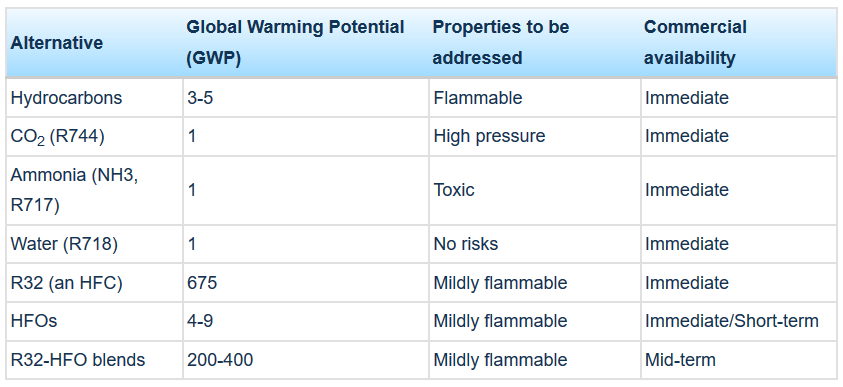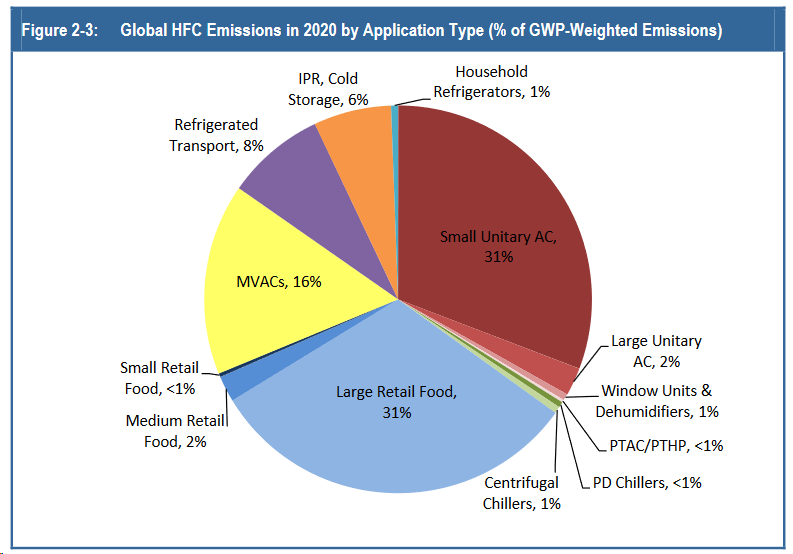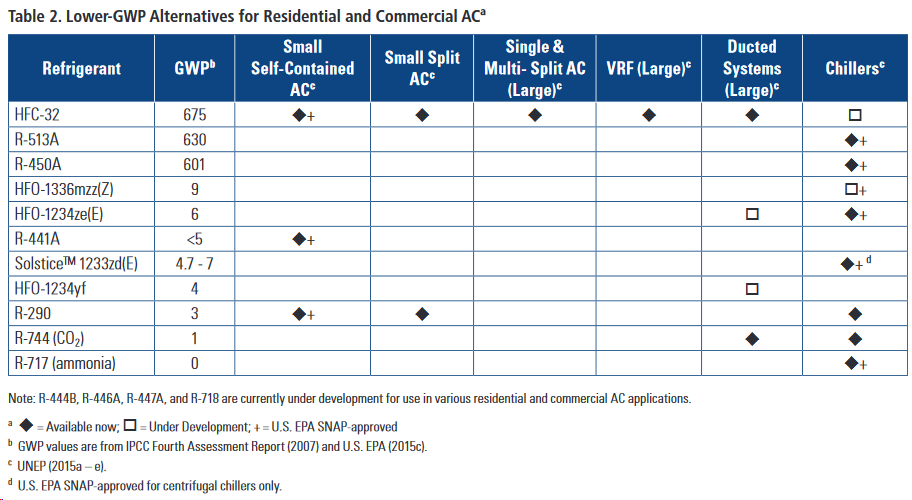Are there any HFC-free air conditioners on the market? How about refrigerators? Given the massive warming potential of HFCs I would expect there to be more information on how to avoid HFCs and on what alternatives exist but I'm struggling to dig up clear answers...
1 Answer
Background
Legislation mandating alternatives
To control emissions of HFCs and other fluorinated gases (F-gases), Europe has two pieces of legislation: the F-gas regulation and the Mobile Air-Conditioning (MAC) directive. In the U.S., the Environmental Protection Agency has the Significant New Alternatives Policy (SNAP).
Alternatives to HFCs
The EU provides a helpful list of "Climate-friendly alternatives to HFCs and HCFCs" which details the pros and cons of each:
The page goes on to explain which of these alternatives are best used in various different use cases, including refrigerators and air conditioners (both in homes and cars).
Under SNAP, the U.S. EPA provides some helpful fact sheets on HFC alternatives in each of the main domestic or personal uses:
Where refrigerants are used
Next it's helpful to see where refrigerants are used, to narrow the focus on where using alternatives will be the most helpful. The chart below is from the U.S. EPA 2013 report, "Global Mitigation of Non-CO2 Greenhouse Gases: 2010-2030".
Here you can see that household refrigerators make up a very small part of the problem at 1% of global emissions. Instead, we should focus on motor vehicle air conditioning (MVAC) at 16% and small unitary AC (such as window air conditioners) at 31%.
How to attack the problem with home air conditioning
Taking the biggest part of the pie, what can we do immediately to reduce emissions of HFCs?
Recycling appliances with HFCs
First of all, wherever practical and economical, equipment with HFCs should be taken out of use. When this is done it is essential that the HFCs they contain by captured so it is not released to the atmosphere.
In the U.S., the EPA runs the Responsible Appliance Disposal program which provides information about how to recycle appliances with HFCs. Critically, they also provide a searchable map with links to partner programs -- services where you can turn in your old refrigerator, AC, or dehumidifier and be assured that the HFCs will be properly captured and disposed of.
In Europe, the Waste Electrical and Electronic Equipment (WEEE) directive seems to be the legislation that would require proper disposal of appliances with HFCs, but I'm having trouble finding details for consumers on how to properly dispose of their appliances.
Selecting new appliances with alternative refrigerants
The chart below is the from the EPA's air conditioning fact sheet (the same one linked above), and shows which type of home AC is available with the different HFC alternatives.
Based on this chart, the best choice for home air conditioning is units with R-290 (another name for propane) or R-441A (a blend of ethane, propane, butane, and isobutane).
HFC-32 is an option, though not ideal. While still an HFC, it does have roughly half the global warming potential of R-410a (currently the most common refrigerant in the U.S.). Due to the European F-gas and U.S. SNAP regulations, R-410a will be phased about by 2021 (source), and HFC-32 seems most likely to replace it on a wide scale.
Current challenges in the U.S.
Unfortunately, at this point for consumers in the U.S., the trail seems to run cold. From what I can find, it is not possible to purchase a new air conditioner with either of these refrigerants in the U.S.
While R-441a is intended to serve as a drop-in replacement for R-410, R-22, and R-134a (source), doing this in practice doesn't reduce the amount of HFCs produced, and runs the risk of leaking more HFCs to the atmosphere in the process of replacing the original refrigerant (it also seems rather complicated based on this 50 page instruction manual). The only place this might make sense is if you have a leaky air conditioner -- once the leaks are fixed, you could replace the old HFC with R-441a.
TL;DR recommendations
- Make sure to properly recycle non-functional refrigerators and air conditioners.
- For a leaky air conditioner, fix the leak and replace the refrigerant with a hydrocarbon such as R-441a.
- Otherwise, try to keep your air conditioner working for as long as possible -- eventually refrigerants with higher global warming potential will be phased out, and the replacements will have more environmentally friendly refrigerants.
-
1This was super well put together, thanks! I’m bummed there isn’t better information available but I think you hit the nail on the head about what the best steps are at this time in lieu of legitimate alternatives, thanks.– TravCommented Feb 16, 2019 at 22:34


